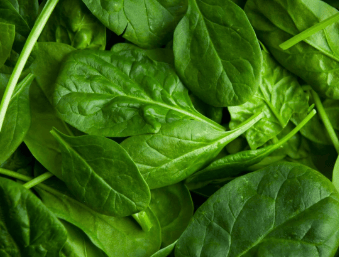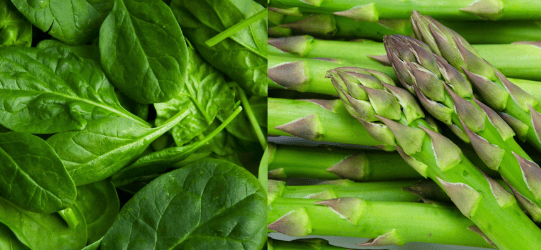When it comes to heart-healthy eating, green vegetables are at the top of the list—and two of the most popular options are asparagus and spinach. Both are nutrient-dense, low in calories, and packed with vitamins, minerals, and antioxidants. But when you’re choosing vegetables to support your cardiovascular system, does one come out ahead?
Heart disease prevention relies heavily on diet, especially foods that can help regulate blood pressure, improve cholesterol levels, and reduce inflammation. Leafy greens and green vegetables offer many of these benefits, but their nutrient profiles vary in important ways.
In this article, we’ll break down the nutritional value of asparagus vs spinach, look at how each supports heart health, and help you decide which one might be a better fit for your goals. If you’ve ever wondered “which is better for heart health, spinach or asparagus?”, you’re in the right place. Let’s dig into the science and make sense of these two superfoods.
Nutritional Overview: Asparagus vs. Spinach
Both asparagus and spinach are nutritional powerhouses that deliver heart-friendly benefits. But when we look closer, their nutrient profiles highlight different strengths that may impact your choice—especially if you’re focused on cardiovascular health.
Spinach is incredibly rich in vitamins A and C, as well as iron, which is great for red blood cell production. It’s also high in magnesium, which helps regulate blood pressure. However, spinach contains higher levels of oxalates, compounds that can interfere with calcium absorption.
Asparagus, on the other hand, is a fantastic source of vitamin E, a potent antioxidant, and has fewer oxalates, making it friendlier for bone and mineral balance. It’s also higher in folate, a B-vitamin essential for breaking down homocysteine, a compound linked to heart disease. Plus, asparagus offers more dietary fiber per 100g, making it a standout among high fiber vegetables.
Both are excellent potassium-rich vegetables, which support healthy blood pressure. Here’s how they stack up per 100g serving:
| Nutrient | Asparagus | Spinach |
| Calories | 20 | 23 |
| Fiber (g) | 2.1 | 2.2 |
| Potassium (mg) | 202 | 558 |
| Folate (mcg) | 149 | 194 |
| Vitamin K (mcg) | 41.6 | 482 |
| Vitamin C (mg) | 5.6 | 28 |
| Vitamin E (mg) | 1.5 | 2 |
| Magnesium (mg) | 14 | 79 |
| Iron (mg) | 1 | 2.7 |
Each has unique benefits. Depending on your heart health goals, one may serve you better—but ideally, both should have a place in your diet.
Cardiovascular Benefits of Asparagus

When it comes to protecting your heart, asparagus stands out as a green vegetable packed with heart-supportive nutrients. Its benefits go far beyond basic nutrition, with several compounds that directly contribute to better cardiovascular function.
One of asparagus’s key nutrients is folate, a B-vitamin that plays a major role in reducing levels of homocysteine—an amino acid linked to a higher risk of heart disease when elevated. In fact, increased folate intake has been associated with reduced cardiovascular risk in multiple population studies, making asparagus a top food source for those looking to support heart health naturally.
Asparagus is also rich in potassium, a mineral that helps regulate blood pressure by balancing the effects of sodium in the body. Just one serving of asparagus provides over 200 mg of potassium, making it a great addition to a potassium-rich diet for blood pressure control.
Another benefit lies in its impressive antioxidant content. Asparagus contains glutathione, one of the body’s most powerful antioxidants, along with flavonoids and saponins that help reduce oxidative stress—a key contributor to heart disease. These compounds also have anti-inflammatory properties, which may lower chronic inflammation that can damage arteries over time.
In summary, the link between asparagus and heart health is well supported by its unique nutritional makeup. With folate for heart health, potassium, and antioxidants all working together, asparagus is an excellent vegetable to include in a heart-smart diet.
Cardiovascular Benefits of Spinach

If you’re aiming to support your heart naturally, spinach delivers impressive cardiovascular benefits backed by science. This leafy green is loaded with heart-friendly nutrients that work together to promote healthy blood flow, reduce inflammation, and protect against long-term vascular damage.
One of spinach’s standout features is its high nitrate content. Dietary nitrates, found abundantly in spinach, are converted in the body to nitric oxide—a compound that helps relax blood vessels and lower blood pressure. Several studies, including randomized clinical trials, have shown that nitrate-rich vegetables like spinach can improve arterial function and reduce hypertension risk.
Spinach is also a good source of magnesium, a mineral essential for maintaining a steady heartbeat and normal blood pressure. Adequate magnesium levels have been associated with a lower risk of arrhythmias and other cardiovascular issues.
In addition, spinach is rich in vitamin K, which plays a role in preventing arterial calcification and stiffness. While commonly known for its role in blood clotting, vitamin K may also help protect arteries and improve overall vascular health.
Lastly, spinach is packed with antioxidants like lutein and beta-carotene, which combat oxidative stress and inflammation—two major contributors to heart disease.
In short, the connection between spinach and heart health is strong. Thanks to its combination of nitrates, magnesium, vitamin K, and antioxidants, spinach is a smart, easy addition to any heart-healthy meal plan.
Scientific Studies & Medical Opinions
When it comes to cardiovascular health, both asparagus and spinach have gained support from the scientific and medical communities. Research shows that the nutrients in these vegetables may play key roles in preventing heart disease and improving overall vascular function.
Asparagus in Research
A 2020 review published in the journal Nutrients emphasized the cardiovascular importance of folate-rich vegetables. Folate, found abundantly in asparagus, was shown to lower homocysteine levels, a known risk marker for heart disease. Elevated homocysteine can damage blood vessels and promote clot formation. The study concluded that increasing folate intake through diet could reduce cardiovascular risk, particularly in older adults.
Another study in Oxidative Medicine and Cellular Longevity found that glutathione, a powerful antioxidant present in asparagus, helps reduce oxidative stress in blood vessels, potentially protecting against atherosclerosis.
Dr. Megan Rossi, a registered dietitian and researcher, notes, “Vegetables like asparagus that are high in folate and antioxidants are incredibly valuable for long-term heart health.”
Spinach in Research
Spinach has been extensively studied for its nitrate content, which is known to improve blood pressure and endothelial function. A 2015 study published in the Journal of Nutrition found that individuals who consumed nitrate-rich spinach juice experienced significant reductions in systolic blood pressure just hours after ingestion.
Spinach is also high in magnesium, which plays a crucial role in cardiovascular regulation. According to a 2018 meta-analysis in Hypertension, higher dietary magnesium intake was associated with lower blood pressure and a reduced risk of heart disease.
Furthermore, vitamin K, abundant in spinach, may prevent arterial calcification. Research from Thrombosis and Haemostasis suggests that low levels of vitamin K are linked to greater arterial stiffness and cardiovascular events.
Dr. Lisa Moskovitz, RD, states, “Spinach provides a powerful combination of nutrients that support healthy blood pressure, vascular flexibility, and overall heart protection.”
The science is clear—both asparagus and spinach offer strong cardiovascular support through distinct but complementary mechanisms. Including both regularly in your meals can help keep your heart in top shape.
Head-to-Head: Which Is Better for Heart Health?
When it comes to heart-healthy vegetables, spinach and asparagus both stand tall. But if you’re wondering which one edges out the other in protecting your cardiovascular system, the answer depends on your individual health needs.
Asparagus: Folate and Sodium Advantage
Asparagus is packed with folate, a key B-vitamin that helps lower homocysteine levels—a marker linked to increased heart disease risk. It’s also naturally low in sodium, making it a great option for those managing blood pressure or following a salt-restricted diet. Plus, asparagus offers a good dose of potassium and antioxidants like glutathione, which support healthy arteries by reducing inflammation and oxidative stress.
Spinach: Nitrate and Magnesium Power
Spinach shines with its natural nitrate content, which has been shown in research to help lower blood pressure and improve vascular function. It’s also rich in magnesium, supporting a steady heartbeat, and vitamin K, which may prevent arterial stiffening. These nutrients work together to enhance blood flow and reduce cardiovascular strain.
Side-by-Side Insights
| Nutrient/Benefit | Asparagus | Spinach |
| Folate | Higher | Moderate |
| Nitrates | Lower | Higher |
| Magnesium | Moderate | Higher |
| Vitamin K | Moderate | High |
| Sodium | Naturally low | Slightly higher |
| Antioxidants | Glutathione, flavonoids | Lutein, beta-carotene |
So, which is better for heart health—spinach or asparagus? The truth is, both bring different heart-protective nutrients to the table. Spinach may be better for lowering blood pressure thanks to nitrates and magnesium, while asparagus supports cholesterol and homocysteine regulation.
How to Add Them to Your Diet
Adding spinach and asparagus to your meals is easier than you might think—and it doesn’t have to be boring. Both veggies are versatile, tasty, and quick to cook.
Spinach blends beautifully into smoothies without altering the flavor much. Just toss a handful into your morning blend with berries, banana, and almond milk. It also works great in omelets, soups, and salads—raw or lightly wilted.
Asparagus shines when sautéed in olive oil with garlic or roasted with lemon and herbs. It’s a delicious side for fish or chicken and adds crunch to grain bowls or salads. You can also chop it into soups or stir-fries for extra fiber and nutrients.
To keep the heart-healthy benefits intact, avoid overcooking. Light steaming, roasting, or quick sautéing helps preserve vitamins like folate and vitamin K, and prevents nutrient loss. Skip the heavy creams or butter sauces—opt for olive oil, herbs, and citrus instead for flavor that’s good for your heart.
Mix them into your meals a few times a week to give your heart some love—with every bite.
FAQs: Spinach and Asparagus for Heart Health
Can I eat both spinach and asparagus for heart health?
Yes! In fact, combining both in your diet gives you a broader range of heart-protective nutrients. Spinach is packed with magnesium and nitrates, while asparagus delivers folate and potassium. Together, they make a great team for cardiovascular support.
Is spinach better for blood pressure than asparagus?
Spinach may have the edge here due to its high nitrate content, which has been shown to relax blood vessels and lower blood pressure naturally. Asparagus still contributes with potassium, which helps regulate fluid balance and pressure.
Which is lower in sodium?
Both are naturally low in sodium, making them ideal for a heart-friendly diet. But asparagus contains slightly less sodium per serving than spinach, especially when cooked without added salt.
Are raw or cooked greens better for heart health?
Both forms are healthy, but they offer different benefits. Raw spinach preserves vitamin C and folate, while light cooking boosts absorption of compounds like beta-carotene and lutein. As for asparagus, steaming or roasting helps retain antioxidants without destroying nutrients.
Conclusion: Spinach vs Asparagus — Why Not Both?
When it comes to asparagus vs spinach, there’s no clear winner—because both are rock stars for your heart. Asparagus shines with its folate, potassium, and low sodium content. Spinach packs in nitrates, magnesium, and powerful antioxidants like lutein and beta-carotene.
But here’s the key: variety and consistency matter more than choosing just one. A heart-healthy diet thrives on nutrient diversity. By including both spinach and asparagus regularly, you’re giving your body the fiber, vitamins, and antioxidants it needs to protect your arteries and support long-term cardiovascular health.
So next time you’re grocery shopping, grab a bunch of each. Your heart will thank you.
